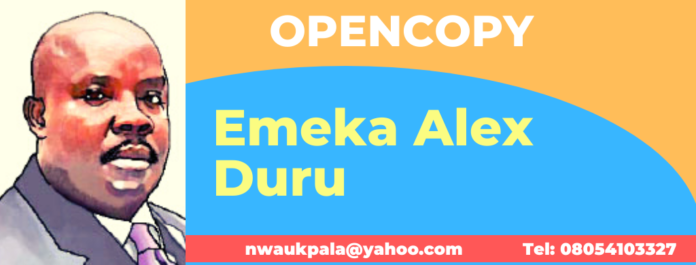Ethnic profiling is unfortunately dictating the tempo of 2023 campaigns.
Less than three weeks to the official flag-off of the 2023 presidential campaigns, signs of what to come are becoming clearer. And indeed, disturbing! Nigerians may be in for a rough deal, perhaps, worse than they are having, if the morning, as they say, tells the day. Mudslinging and ethnic recriminations may dominate public engagements, in place of issue-based campaigns.
Presidential campaigns are ordinarily, carnivals of sorts. They are occasions for glamour, demonstration of eloquence and style. They are moments of stock-taking, reflections and defining the future of the country. That is why presidential debates and manifesto nights are usually taken seriously in advanced democracies.
They are avenues for the candidates to advertise themselves and market their parties to the people and tell them what to expect from them if voted to power. Whatever declarations made by the standard-bearers on such events, are taken as yardsticks upon which they would be assessed while in office. For the incumbent, they provide opportunities to brandish their achievements, while the opposition, cash in on the window to expose the lapses of the party in power and project itself as the alternative or government-in-waiting. In all, the debates afford the electorate the chances to make informed choices.
An incidence in the 1980 American presidential election offers a good illustration on this. In the final week of campaign between the candidate of ruling Democratic Party, President Jimmy Carter and Republican nominee, Ronald Reagan, the two were put on debate. In course of the exercise, Reagan posed what has become one of the most important campaign questions of all time: “Are you better off today than you were four years ago?” Carter’s answer was a resounding “NO”. That response was what the voters needed to deny him re-election but America as country won in the long run. That is the beauty of presidential campaign.
READ ALSO:
2023 elections and the future of Nigeria’s democracy
As the Independent National Electoral Commission (INEC) gets set to lift the seal on the campaigns, you would expect the presidential candidates of the leading political parties in the country and their foot soldiers addressing their minds to such important questions as Nigeria, yesterday, today and possibly tomorrow. The presidency is the hardest job in the world, says American essayist, John Dickerson, in his piece on the White House. He prescribes that when the national fabric rends, the president will administer needle and thread, or at least reach for the sewing box of unity. This is a big lesson for those aspiring for the office.
But that is not what we are getting here, so far. It is rather campaigns of calumny and regurgitation of primordial sentiments. Ethnic profiling is unfortunately dictating the tempo of 2023 campaigns. In place of interrogating and analysisng the contents of pronouncements by the presidential candidates, their persons, capacity and pedigrees, issues of regions of birth are being played up, obviously to divide the people.
In Lagos for instance, the campaigns are drifting from the challenges facing the country to such fleeting topic as ownership of the city. In the process, drinking joint banters or off-hand jibes by loose minds, are being cited as reasons to profile others and accuse them of attempting to take over the state. Since the emergence of the Labour Party (LP) presidential candidate, Peter Obi, and the momentum he has been generating especially among the youths and down trodden Nigerians, there have been waves of insinuations on the Igbo “plotting to covet Lagos state”. Suddenly, the allegation of the Igbo purporting that “Lagos is no man’s land” has been on the rise and penetrating. South West supporters of the All Progressives Congress (APC) candidate, Bola Tinubu, are firing relentlessly on this.
But that is a ruse. There is no space that can be described as “no man’s land”. Every entity has an indigenous population with certain claims of ownership either by conquest, annexation, migration or even autochthony. Lagos cannot be an exception. Regardless the length of residence of an Igbo or any other non-indigene in Lagos, he/she remains a visitor.
Next to this is the lazy recollection of subjective narratives of the First Republic politics featuring the hackneyed mistrust between Dr. Nnamdi Azikiwe and Chief Obafemi Awolowo, for which some Igbo and Yoruba seem sworn not to accept one another. The idea behind raking up these baseless topics is to widen the wedge between the people from the two regions. The agenda may appear simple on the surface. But most genocidal killings, xenophobic attacks and ethnic cleansings in history, had started by what seemed casual profiling of the victims. That is the reason why these reckless expressions of sordid sentiments, should not be taken lightly
Importantly, they are not issues that should bother Nigerians, presently. The candidates need to tell us how they intend to tackle the challenges facing the country. These are matters of failed governance, infrastructure collapse, insecurity, youth unemployment, depreciating value of the national currency, endemic strikes in the institutions of higher learning and restiveness in the component units of the country.
The United Nations Educational, Scientific and Cultural Organisation (UNESCO), just released a data the other day, which puts Nigeria as having about 20 million out-of-school children. The rate before was between 10.5 and 13.5 million. But with insecurity and kidnapping of school children, some parents are scared of sending their wards to school in some parts of the country. The present estimate is worrisome.
Elsewhere, though there seems a disagreement on an earlier report by a global terrorism research/analysis group, Jihad Analytics (JA) which placed Nigeria as the second most terrorised/attacked country and that of fact-check which quotes the Global Terrorism Index (GTI) as saying that the country is sixth in the league, the fact is that the climate of insecurity remains high, here. Farmers can no longer access their farms, resulting to food insecurity in the land. In other indices of development, we are not faring better. Nigeria remains the Poverty Capital of the World since 2018.
Nigeria tops the list of fragile, failing states and now the most stressful country to live in, according to the stress level index. For seven months running, students in public universities have been out of school due to the face-off between their teachers under the aegis of the Academic Staff Union of Universities (ASUU) and the Federal government over unfulfilled agreements. Some Nigerians abducted in the Abuja-Kaduna bound train on March 28, are still held by their captors, while the government looks the other way.
These are the issues that should matter in the 2023 debate. The task ahead is enormous and not the trivial issues of the Igbo or any group trying to take over Lagos or indeed any state in the country, for that matter. Nigerians do not have the time for such idle talk.







